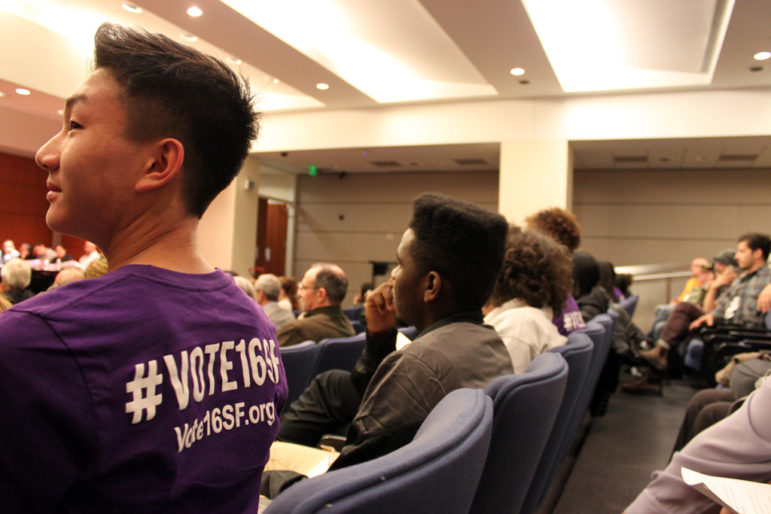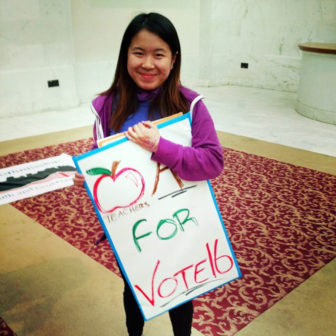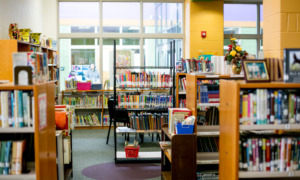Should 16- and 17-year-olds be able to vote?
That was a question San Francisco and Berkeley, California, residents considered as part of the 2016 general election.
And on Nov. 8, Alex Koroknay-Palicz was watching. He’s president of the National Youth Rights Association, a national nonprofit that advocates for the civil rights of young people.
Ultimately the measure in San Francisco was defeated. But in neighboring Berkeley, 16- and 17-year-olds were successful: They won the right to vote for local school board candidates.
“We are tremendously impressed, even though it didn’t pass,” Koroknay-Palicz said. He believes the effort, which would have affected only city elections, has a good chance in the future. The measure, which enjoyed the support of the U.S. House Minority Leader Nancy Pelosi and the San Francisco Board of Education, received 48 percent of the vote.

“We were overjoyed with the [success of the] measure,” said Simelia Rogers, 16, a junior at Berkeley High School. She was one of a group of about a dozen students who began meeting in September 2015 to address issues such as racism and sexual assault in the school and community.
“We realize that a lot of problems … come back to who we elect to school board and how they handled them,” she said.
The youth led the campaign — with support from school board member Josh Daniels and Kad Smith, advisor to the YMCA Youth & Government’s Model Legislature & Court — to lower the voting age in school board elections by getting city of Berkeley voters to pass the measure.
The effort to lower the voting age in local elections has been a movement for about 15 years, Koroknay-Palicz said.
Many decisions are made that affect the daily lives of young people — particularly decisions around school — but young people have no say in them, he said.

“Elections offer the chance to see what teachers want, what parents want and what taxpayers want,” he said. But students are not asked, he said.
“We live in a democracy,” Koroknay-Palicz said. “That system only works if all the people who have an interest in society are represented.”
Oliver Sanghvi York, now 17 and a senior at Lick-Wilmerding High School, was one of two students who proposed in the fall of 2014 to lower the voting age in San Francisco. York took the idea to the San Francisco Youth Commission and then helped launch the youth-led campaign Yes on F // Vote16SF.
“For me, this is all about civic engagement and increasing civic participation over the long haul,” he said.
“Age 18 is not a good age for students to develop the lifelong habit of voting,” York said. However, at age 16, students are studying civics, American history and democracy in high school, he said.
“They are embedded in the community they’ve grown up in and know a lot about” it, he said.
 In contrast, said Brandon Klugman, coordinator of Vote16USA, a national campaign to lower the voting age, 18-year-olds are in transition into the workforce or into college and are in a less stable environment.
In contrast, said Brandon Klugman, coordinator of Vote16USA, a national campaign to lower the voting age, 18-year-olds are in transition into the workforce or into college and are in a less stable environment.
“We know voting is habitual,” he said.
“There’s no better way to make civics relevant than by inviting young people into the voting booth at a local level,” he said.
The San Francisco Chronicle, however, editorialized against the lower age. Voting is a privilege of adulthood, the editorial asserted.
“Young people must wait until the age of 21 to drink alcohol and, in California, smoke tobacco. They must wait until the age of 18 to serve their country. It makes no sense for San Francisco to send the message that voting is a responsibility any less serious than these are.”
Two cities in Maryland let 16-year-olds vote
The ballot measure in San Francisco was a first in a major U.S. city, Klugman said.
However, two cities in Maryland have already lowered the age to 16 in city elections through a city council vote. Takoma Park did so in 2013 and Hyattville in 2015. Other cities, such as San Francisco, are required to put the question to voters.
About a dozen states and the District of Columbia allow cities to lower the voting age for municipal elections, according to Generation Citizen, a nonprofit that sponsors Vote16USA.
“It’s a great way to increase youth voter turnout and engagement,” Klugman said.
































